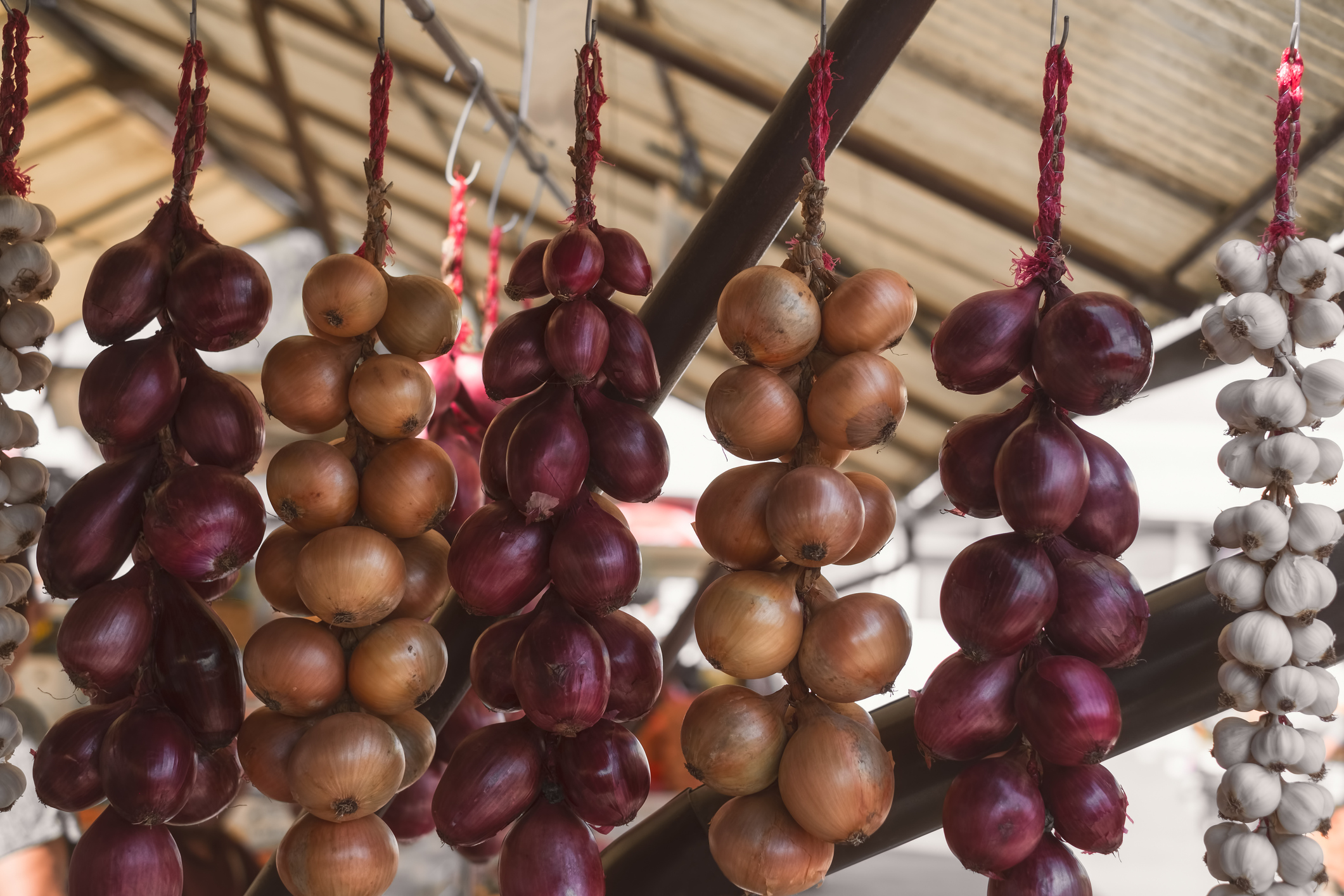How to store onions – so they last longer
Discover how to store onions. These are the details on keeping homegrown and store-bought at their best


Design expertise in your inbox – from inspiring decorating ideas and beautiful celebrity homes to practical gardening advice and shopping round-ups.
You are now subscribed
Your newsletter sign-up was successful
Want to add more newsletters?

Twice a week
Homes&Gardens
The ultimate interior design resource from the world's leading experts - discover inspiring decorating ideas, color scheming know-how, garden inspiration and shopping expertise.

Once a week
In The Loop from Next In Design
Members of the Next in Design Circle will receive In the Loop, our weekly email filled with trade news, names to know and spotlight moments. Together we’re building a brighter design future.

Twice a week
Cucina
Whether you’re passionate about hosting exquisite dinners, experimenting with culinary trends, or perfecting your kitchen's design with timeless elegance and innovative functionality, this newsletter is here to inspire
Wondering how to store onions? As an ingredient in so many dishes, they’re a kitchen staple and correct storage after you’ve brought them home from the grocery store will ensure they retain the flavor and quality that’s necessary for delicious meals.
Of course if you know how to grow onions, you’re certain to harvest more than you can use right away, and in this case the right storage technique means you can cook with homegrown onions through the winter.
Here, we provide the lowdown on how to store onions whether they’re from the veggie garden or purchased so they’re ready to cook for as long as possible.
How to store onions
Get the timing of when to plant onions right and a bountiful harvest can be yours, so storage knowhow is crucial to avoid waste. But even store-bought onions require storage savvy to keep them in good condition.
Gaining expertise is well worthwhile. ‘You can generally store onions up to eight months,’ says Jeannie Nichols at Michigan State University Extension.
This is the lowdown on how to store onions.
How to store onions from a grocery store
The onions you brought home from the store or a farmer’s market should be kept in a place that’s cool, dry and dark as well as well ventilated. Keep them in the pantry, for example, a cellar, or a kitchen cabinet but avoid those next to appliances. Never keep them in plastic bags – even if that’s how they were sold.
Design expertise in your inbox – from inspiring decorating ideas and beautiful celebrity homes to practical gardening advice and shopping round-ups.
One neat trick for onion storage is to put them into clean pantyhose. Put one into a leg, tie a knot then continue in the same way to the top and do the same with the other leg and they’re easy to suspend for storage. You can also find special onion pots or onion baskets to keep them in, but any well ventilated basket or a large bowl will work.
Onions can be stored this way for some months, but do check on a stash and remove any that are showing signs of deteriorating.
How to store homegrown onions
Knowing when to harvest onions is key to ensuring a good crop. Onions harvested from your own vegetable garden can then be stored by stringing as well as individually but before they are stored, they should be dried.
To dry them, put the harvested onions on a rack or onto some newspaper in a well ventilated covered space like a greenhouse, making sure they are well spread out from one another.
Allow to dry for a couple of weeks. They should have papery skins, the leaves should be shrivelled, and the roots dry. Put aside any that are damp, which should not be stored.
Cut off roots and remove loose skin, and cut the stems to the neck of the bulb or, if you like the idea of storing onion strings, leave around 2 or 3in (5 to 8cm) of stem.
To store homegrown onions individually put them into net bags. Suspend these (or onion strings, created as below) above the ground in a cool, dry well ventilated space such as a cellar, garage or unheated room. Check from time to time and remove any onions that are deteriorating.
How to string onions for storing
To string onions, take a length of garden twine around 3ft (1m) long, tie the ends together to make a loop, and hang the loop from a hook.
Make a loop in the bottom of the string and put the stem of an onion into it and tighten the loop to hold the onion in place. Add onions above this one by positioning immediately above, and working their stems around the string loop figure of eight style to hold each in place. Be sure to work around the string so the onions are bunched above the one on the base, but be aware of the weight as you work to avoid overloading the string.
How to store onions in the refrigerator
If an onion is already peeled, it can be stored in the refrigerator short term at the usual temperature of 40ºF (4ºC) or below.
Onions that you’ve cut or sliced can also be kept in the refrigerator. Put them into an airtight container – preferably glass as plastic absorbs the smell – and use within seven to 10 days. ‘If you buy pre-cut onions, follow the manufacturer’s “use by” dates,’ advises the National Onion Association (NOA).
How to store sweet onions
Sweet onions don’t last as long as others from the store because they contain more water. ‘To make sweet onions last longer, wrap in paper towels or newspaper and store in the fridge,’ says the NOA.
Do onions last longer in the fridge or on the counter?
Onions last longer in a cool, dark and dry space that’s well ventilated, so neither the counter nor the fridge are ideal. The refrigerator is too cold as a rule, plus it’s humid, and on the counter onions are likely to get too hot and they’re in the light.
The exception is onions that are already peeled, or peeled and chopped and these are best kept in a sealed glass container in the refrigerator where they’ll last a week or a couple of days longer.
What is the best way to store potatoes and onions?
The best way to store potatoes and onions is separately. It’s true that, as a general rule, they should both be stored in cool, dark and dry places but that doesn’t mean they should be together.
It’s the potatoes that won’t keep well if the two are together. ‘Keeping onions nearby will actually cause them to sprout,’ say the experts at StopFoodWaste.

Sarah is a freelance journalist and editor. Previously executive editor of Ideal Home, she’s specialized in interiors, property and gardens for over 20 years, and covers interior design, house design, gardens, and cleaning and organizing a home for Homes & Gardens. She’s written for websites, including Houzz, Channel 4’s flagship website, 4Homes, and Future’s T3; national newspapers, including The Guardian; and magazines including Future’s Country Homes & Interiors, Homebuilding & Renovating, Period Living, and Style at Home, as well as House Beautiful, Good Homes, Grand Designs, Homes & Antiques, LandLove and The English Home among others. It’s no big surprise that she likes to put what she writes about into practice, and is a serial house renovator.